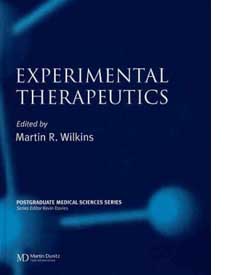|
|
|

Publisher: Martin Dunitz, ISBN: 1841842907, Pub Date: 2003, Price: £41.95, Extent: 248 pages, Illustrations: 100
Order: Amazon
Introduced by:
Sir Colin Dollery
The development and use of new medicines remains a formidable challenge. In 2001, the pharmaceutical industry spent $44 billion on research and development of new agents. How well that money will not be apparent for another decade or more. It now costs an average of £550 million ($800 million) to bring a drug to market, more than twice as much as in 1987. Much of this money (perhaps up to 70%) is spent on drugs that fail on the path to licensing. As a rule of thumb, for every 10,000 molecules screened in a given programme in the laboratory, only one will survive to launch. To minimise costs, companies need to catch potential failures, due either to lack of clinical effect or toxicity, in the early discovery phase, long before they reach patients.
Experimental Therapeutics is primarily written for clinicians and scientists with an active interest in experimental medicine as an introduction to this dynamic and competitive discipline. It is hoped that this book will act as a useful primer for anyone with a novel idea for advancing the pharmacological management of disease.
Contents:
Series Preface; Introduction/Preface;
Section I. Drug Discovery and Development.
1. The Clinical Pharmacologist's View: Drug Discovery and Early Developments Sir Colin Dollery (Welwyn, UK)
2. The Toxicologist's View: Non-Clinical Safety Assessment Anthony Lynch (Welwyn, UK) and John Connelly (London, UK)
3. The Regulator's View: Regulatory Requirements for Marketing Authorisations for New Medicinal Products in the European Union Rashmi R. Shah, Sarah K. Branch, and Christopher Steele (London, UK)
Section II. Clinical Pharmacology
4. Principles of Pharmacokinetics Andrew G. Renwick (Southampton, UK)
5. The Use of Pharmacogenetics to Maximise Therapeutic Benefit Christian Meisel (Berlin, Germany) and Matthias Schwab (Stuttgart, Germany)
6. Drug Chirality: Pharmacology in Three Dimensions Andrew J. Hutt (London, UK)
7. Surrogate Endpoints James Oliver and David J. Webb (Edinburgh, UK)
8. Positron Emission Tomography (PET) as a Tool in Pharmacology: Examples from Neuroscience EA Rabiner and PM Grasby (London, UK)
Section III. Novel Therapies
9. Targeting Nuclear Receptors: PPARs as Targets for Drug Design Colin N. A. Palmer (Dundee, UK) and Martin Wilkins (London, UK)
10. The Use of Antisense Oligonucleotides as Therapeutic Agents Punit Ramrakha (London, UK)
11. Gene Therapy: Theoretical and Practical Aspects Rebecca Kreinsleit and Martin R. Wilkins (London, UK)
Series Information:
Postgraduate Medical Sciences Series
Author Biography:
Martin R. Wilkins, MD, FRCP, is Professor of Clinical Pharmacology, Division of Medicine, Faculty of Medicine, Imperial College of Science, Technology, and Medicine, Hammersmith Hospital, London, UK
|
|
Differentiation - free sample issue
Wanner. Höfner. 2007. Mass Spectrometry in Medicinal Chemistry.
Mirkin. Niemeyer. 2007. Nanobiotechnology II: More Concepts and Applications
Marx. Sandig. 2006. Drug Testing In Vitro: Breakthroughs and Trends in Cell Culture Technology
Hillenkamp. Peter-Katalinic. 2007. MALDI MS: A Practical Guide to Instrumentation, Methods and Applications
Call for Chapters for the Handbook of Research on Systems Biology Applications in Medicine
OpenHelix announces free trial subscriptions to its database of tutorials on genomic resources
Junghans et al. 2006. Intellectual Property Management
Cold Spring Harbor Laboratory Press to Launch CSH Protocols
Sabaté et al. 2003. Adherence to Long-Term Therapies: Evidence for Action (WHO)
Pathy. 2005. Principles and Practice of Geriatric Medicine. 4th Edition
Brigelius-Flohé. Joost. 2006. Nutritional Genomics
more news ...
|
